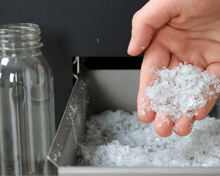FM ONE Essentials: Overview
This is a collection of resources that helps navigate the whole extrusion process. It has links to all the essentials: explanation of FM ONE features, practical information, theory, and actionable steps. Explore with freedom, come back to it later.
Filament Maker ONE Features
The HopperThis the Hopper, or the entrance where the material is fed into the machine for processing. The associated term and action is feeding. |
The ScrewThe core of the extrusion system is an extruder screw inside a barrel. After the material is fed into the Hopper, the particles are pushed forward further into the barrel by the screw threads. The screw (along with other features) is responsible for the flow. |
|
|
The HeatersHeat is applied from four Heaters around the outside of the barrel. Heaters are labelled H4, H3, H2, and H1 from Hopper to Nozzle. Along with the Heaters, material melting is caused by friction, too. |
The NozzleVery simply put, the nozzle provides the already hot and liquid material to flow out of the Filament Maker which is then ready for cooling. This action gives the whole process its signature name: extrusion. The material at this point is not a filament yet, but is called the output. |
|
|
|
The FansThe Fans' job is to solidify the material before it gets to the Puller Wheels. Also known as the Filament Fans or the Cooling Fans, the associated action and term is cooling. This is where the material enters its final stage to become a filament, ready for measuring. |
The SensorThe singular function of the Sensor is to measure the filament diameter and provide data for DevoVision and the Puller Wheel. The crucial information collected by the Sensor helps refine or finetune the whole process. |
|
|
|
The PullerPlaced strategically between the Sensor and the Spooler, the Puller Wheels help establish consistency with the filament diameter. Feeding off data measured by the Sensor, the wheels automatically adjust to allow for a consistent spooling. |
The SpoolerNaturally, the Spooler (or Spooler Wheel) spools. This feature is only used during the Spooling Phase. |
|
Non-Hardware Essentials

Material Selection
The fundamental start to help you understand your materials. This article covers the basics of polymers, grades, MFIs, and what to research on before you begin your extrusion process.

Purging
How to download, set up, log, and analyze your datalog during and after each extrusion. This will help you collect more data and inform and refine your process along the way.
Practice
Good filament can only be produced after following a specific sequence of steps, or phases. This is an overview of the different phases during an extrusion run. This will become essential practice.


